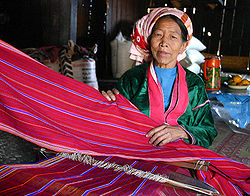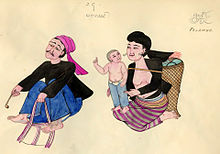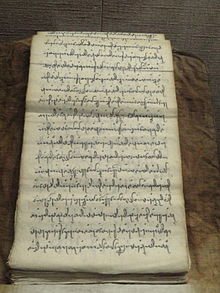- Palaung people
-
Palaung
De'ang
ပလောင်
A Palaung tribal woman near Kalaw, Shan State, Burma. Total population 557,000 (est.) Regions with significant populations Burma, smaller populations in China: Yunnan, Thailand Languages Religion Theravada Buddhism
The Palaung (Burmese: ပလောင် [pəlàuɴ lùmjóʊ]; Thai: ปะหล่อง, also written as Benglong) are a Mon–Khmer ethnic minority found in Shan State of Burma, Yunnan province of China and northern Thailand. They live mainly in the northern parts of Shan State in the Pa Laung Self-Administered Zone, with the capital at Namhsan. There are three main subgroups of Palaung: the Palé, Shwe and Rumai.[1] The Palaung State Liberation Army was a rebel group which fought against the Burmese government starting from January 1963 but entered a cease-fire agreement with the Burmese government in April 1991.
In China, they are referred to as the De'ang (Chinese: 德昂族; pinyin: Déáng Zú also spelt Deang) people. The Chinese government groups together the Palé, Riang, Rumai and Shwe peoples as the De'ang ethnic nationality. The group also includes the Danau (Danaw) who may no longer have a separate identity from the Palé.
Contents
Language
There are several distinct Palaung languages. Depending on their subgroup, the Palaung speak Palé, Riang, Rumai or Shwe.[2] Ethnologue lists three Palaung languages (Rumai, Ruching, and Shwe. Related to Palaung, but forming a separate group are two Riang languages, Riang and Yinchia. All of these languages belong to the Palaungic ("Palaung" or "Ta-ang") sub-group of the Mon–Khmer language family. The Riang languages are reported to be unintelligible or only understood with great difficulty by native speakers of the other Palaung languages.
Phonology
Shorto (1960) lists the following consonants for Palaung:
Labials Dentals Palatals Velars Glottal p t t͡ɕ k ʔ b d d͡ʑ g m n ɲ ŋ v s r,l j Front Central Back High i ɯ u Mid tense e o Mid lax ɛ ə ɔ Low a According to Shorto (1960), /ə/ does not occur alone in primary stressed syllable, but only in an unstressed syllable or as the second member of a diphthong. There are also a large number of diphthongs, including /eo/, /eə/, /aə/, /ɔə/, /oə/, /uə/, and /iə/.
Although Milne (1921) includes the vowels /ü, ö, ɪ/ in her transcriptions, Shorto (1960) did not find these as vowel phonemes in his work.
(Note that the words cited below in the Syntax section come from Milne (1921), so their phonetic representations may need revision.)
Syntax
Nouns and noun phrases
The order of elements in the noun phrase is N - (possessor) - (demonstrative)
Consider the following examples:
kwɔɔn ai öö child we two this this child of ours Prepositions and prepositional phrases
Rumai Palaung has prepositions, as in the following example:
ta khuun hɔɔkhəm to great king to the great king Sentences
Clauses in Rumai are generally in subject–verb–object (SVO) order:
əən dii d͡ʒüür gaaŋ he future buy house He will buy a house Text sample
The following part of a story in Rumai Palaung is from Milne (1921:146-147)
Naaŋ̩ rashööh, naaŋ jü grai ta khuun hɔɔkhəm naaŋ daah, lady awake lady narrative:past said to great king lady say The queen awoke and said to the king öö ka tööm rɪɪnpoo hlai uu lööh khənjaa öö ai lɔh shoktee haa öö oh neg ever dream even one time ruler oh we two come fast place this 'Oh, I never dreamed (like this) before, oh Ruler, (since) we two came to this place to fast Phadiiu nɔ la puur shəŋii, ɔɔ rɪɪnpoo khuun phii leeh today full good seven day I dream great spirit come down seven days ago. I dreamed that the great spirit came down dɛh ɔɔ hɔɔm makmon kəəm ŋaam hnjo hnjo give me eat long mango gold sweet very and gave me long mangoes of gold to eat. They were very sweet.' Religion
Most De'ang are adherents of Theravada Buddhism and Buddhist temples can be found in most of their towns. Buddhism is present in all of the daily activities of this ethnic group. At the age of 10, many children are sent to the monasteries, primarily for education. Most of them return to lay life in later years.
The Riang are the only one of the four groups who have never converted to Buddhism. The majority of the Riang are animists.
Notes
- ^ Palaung = The Peoples of the World Foundation
- ^ Klose, Albrecht (2001) Sprachen der Welt: ein weltweiter Index der Sprachfamilien, Einzelsprachen und Dialekte, mit Angabe der Synonyma und fremdsprachigen Äquivalente (Languages of the world: a multi-lingual concordance of languages, dialects and language-families) Saur, Munich, Germany, page 403, ISBN 3-598-11404-4
Further reading
- Palaung Women's Organisation. (2006). Poisoned flowers: the impacts of spiralling drug addiction on Palaung women in Burma. Tak, Maesot, Thailand: Palaung Women's Organisation.
- Ashley, S. (2006). Exorcising with Buddha palaung Buddhism in northern Thailand. Ottawa: Library and Archives Canada = Bibliothèque et Archives Canada. ISBN 0494033096
- Howard, M. C., & Wattana Wattanapun. (2001). The Palaung in northern Thailand. Chiang Mai, Thailand: Silkworm Books. ISBN 9748832511
- Cameron, A. A. (1912). Notes on the Palaung of the Kodaung Hill tracts of Mong Mit State. Rangoon: Govt. Printer.
- Milne, Leslie. An Elementary Palaung Grammar, Oxford, Clarendon Press (1921).
- Milne, Leslie. A Dictionary of English-Palaung and Palaung-English, Rangoon (1931).
- Milne, Leslie. The Home of an Eastern Clan: A Study of the Palaungs of the Shan State, Oxford, Clarendon Press (1924).
- Shorto, H.L. 1960. Word and syllable patterns in Palaung. Bulletin of the School of Oriental and African Studies, University of London; 1960, Vol. 23 Issue 3, p544-557.
Government-classified ethnic groups in Burma (Myanmar) Kachin (12) Kayah (9) Kayah (Karenni) · Pale · Zayein · Ka-Yun (Kayan; Padaung) · Manu Manaw · Gheko · Yin Talai · Yin Baw · Kayinpyu (Geba Karen)Karen (11) Kayin (Karen) · Pa-Le-Chi · Mon Kayin (Sarpyu) · S'gaw · Ta-Hlay-Pwa · Paku · Bwe · Monpwa · Monnepwa · Shu (Pwo)Chin (53) Anu · Anun · Asho · Awa Khami · Bre (Ka-Yaw) · Chin · Dai (Yindu) · Dim · Eik-swair · Gunte (Lyente) · Guite · Haulngo · Ka-Lin-Kaw (Lushay) · Kaung Saing Chin · Kaungso · Kebar · Khawno · Kwangli (Sim) · Kwelshin · Kwe Myi · Lai (Haka Chin) · Laizao · Lawhtu · Laymyo · Lhinbu · Lushei (Lushay) · Lyente · Magun · Malin · Maramagyi · Matu · Meithei (Kathe) · Mgan · Mi-er · Naga · Ngorn · Oo-Pu · Panun · Rongtu · Saing Zan · Saline · Sentang · Tanghkul · Tapong · Tay-Zan · Thado · Tiddim (Hai-Dim) · Torr (Tawr) · Wakim (Mro) · Yin Gog · Za-How · Zahnyet (Zanniet) · Zizan · Zou · Zo-Pe · ZotungBamar (9) Mon (1) Rakhine (7) Shan (33) Shan · Danaw (Danau) · Danu · Intha · Pa-O · Khamti Shan · Khmu (Khamu) · Kwi · Kokang · Lahu · Palaung · Shan Gale · Shan Gyi · Tai-Loi · Tai-Lem · Tai-Lon · Tai-Lay · Taishon · Taungyo · Wa (Va) · Yao · Yin Kya · Yin Net · Yun (Lao) · Man Zi · Pyin · Eng · Son · Kaw (Akha-E-Kaw) · Maw Shan · Maingtha · Hkun (Khün)Unrecognized Burmese Chinese · Panthay · Burmese Indians · Anglo-Burmese · Rohingya · Gurkha
East South Central Southwest North Northeast Northwest Nationwide Undistinguished ethnic groups in China Ethnic groups in Thailand by language family Tai
Isan · Khorat Thai · Khün · Lanna · Lao · Lao Ga · Lao Krang · Lao Lom · Lao Loum · Lao Ngaew · Lao Song · Lao Ti · Lao Wieng · Lu · Northeastern Thai · Northern Thai · Nyaw · Nyong · Phu Thai · Phuan · Saek · Shan · Southern Thai · Tai Bueng · Tai Daeng (Red Tai) · Tai Dam (Black Tai) · Tai Gapong · Kaleun · Tai Nüa · Tai Wang · Tai Yuan · Thai (Central Thai) · YoyMalayo-Polynesian
Cham · Filipin · Male · Moken · Moklen · Pattani · Satun · Urak LawoiTibeto-Burman
Akha · Bamar · Bisu · Karen · Kayah · Lahu · Lisu · Lolo (Yi) · Mpi · Pa'o · Phrae Pwo · Phunoi · Pwo · S'gaw · UgongChinese
Chinese (general) · Han Chinese (Cantonese · Hakka · Hokkien · Teochew)Hmong-Mien
Hmong · Yao/Iu MienOther
Farang · Indians · Iranians · Japanese · Nepalis · PakistanisCategories:- Buddhist communities
- Ethnic groups in Burma
- Ethnic groups officially recognized by China
Wikimedia Foundation. 2010.


